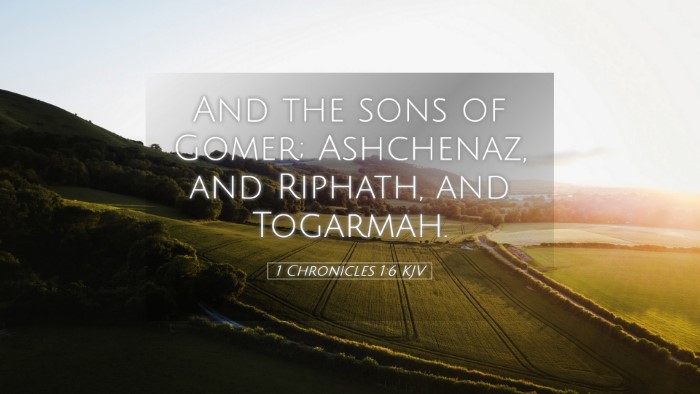Commentary on 1 Chronicles 1:6
1 Chronicles 1:6 states: "The sons of Ham: Cush, Mizraim, Put, and Canaan." This verse serves as an essential introduction to the genealogical records found in the book of Chronicles. As we delve into the commentary on this passage, we gather insights from esteemed scholars such as Matthew Henry, Albert Barnes, and Adam Clarke, each providing valuable perspectives on the significance of these names and their historical context.
Genealogical Importance
Genealogies in the Bible hold significant weight, serving both historical and theological purposes. Matthew Henry emphasizes that these lists are essential to understanding the lineage through which the covenant promises were fulfilled. The mention of Ham's descendants indicates the dispersion of nations and sets the stage for Israel's history.
- Cush: Traditionally identified with the region south of Egypt, believed to correspond to parts of modern-day Ethiopia. This name reflects the vastness of the prophetic promises regarding the nations. Cush is associated with great power and wealth in ancient records.
- Mizraim: Identified with Egypt, this name embodies the richness of the culture and its critical role in biblical events. Albert Barnes notes Mizraim's importance in Israel's story, highlighting both oppression and liberation.
- Put: Less frequently mentioned, Put is associated with regions extending towards North Africa. Adam Clarke mentions that the descendants of Put might have had significant maritime and mercantile activities.
- Canaan: Canaan's mention foreshadows the land of promise that would later become Israel. Henry reflects on Canaan as the land of great importance, noting its curse and subsequent significance in biblical chronology.
Theological Reflections
The list of names in 1 Chronicles 1:6 also serves as a reminder of God's involvement in the affairs of nations and peoples. Each name represents a lineage and a people group with whom God would interact throughout history.
Henry remarks on the sovereignty of God in preserving the narratives of these nations, explaining that they serve as warnings and lessons to Israel regarding idolatry and moral decline. This narrative reinforces the idea that the history of Israel is intertwined with the fates of surrounding nations, calling attention to God's ultimate authority over human affairs.
Cultural Context
Understanding the cultural implications of these names is crucial for students and scholars alike. Albert Barnes addresses the significant role that these nations played in ancient world affairs, asserting that the descendants of Ham were pivotal in the development of early civilizations.
- Political Alliances: The descendants, especially those from Egypt and Canaan, formed crucial political alliances that impacted the Israelites' history.
- Religious Practices: The worship of gods by these nations is juxtaposed to the worship of Yahweh, highlighting the constant temptation faced by Israel to adopt neighboring practices.
- Migrations and Settlements: The movements and settlements of these peoples serve as a backdrop against which Israel finds its own identity.
Conclusion
1 Chronicles 1:6, while a simple genealogical list, opens a window into the complex interactions between nations in biblical history. Each name sheds light on God's overarching plan and the importance of preserving records of lineage, presenting a narrative thread that binds the Old Testament scriptures together.
As we reflect on this verse, it serves as an encouragement to pastors, students, and scholars to delve deeper into the historical and theological significance of such genealogies. They remind us of God's sovereignty over all nations and the fulfillment of His promises throughout history, culminating ultimately in the work of Christ.


